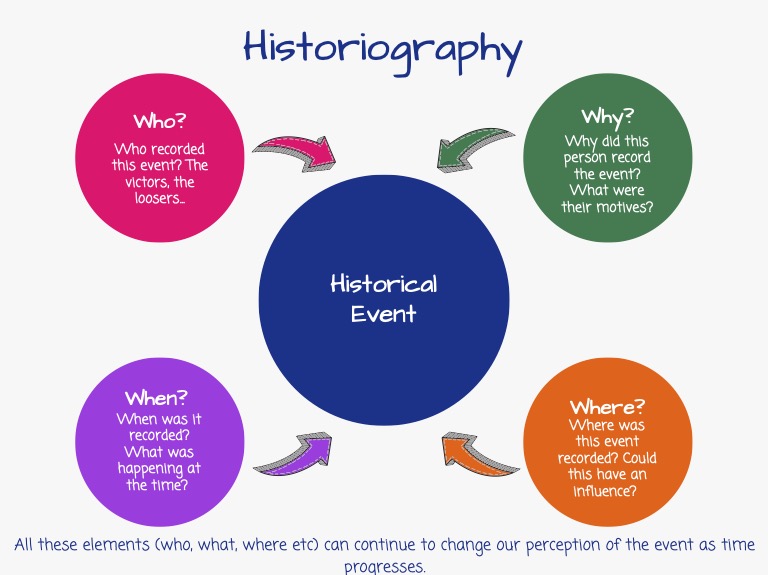Term: Historiography
Introduction:
The assignment is to define a term using multiple formats such as sentence, parenthetical and expanded definitions. The purpose is to practice defining a term to non-technical readers. The reading situation is a history major explaining the term Historiography to their writing team, non of which study history or has any knowledge of the term.
Parenthetical definition:
History is constantly being rewritten, and to combat this, Historians are taught Historiography (the study of how history develops over time) at university.
Sentence definition:
Historiography is a discipline of history that investigates how the content behind a historical event, such as who wrote it, can affect our understanding and how this perception can change over time.
Figure 1: A diagram showing different elements that are studied in Historiography.

Etymology:
Historiography is ‘the history of writing or recording.’
-
- Historico— Latinised from the Greek Historikos, meaning Historical
- —graphy meaning “process of writing or recording”, from the Greek Graphia, meaning description of
(Douglas)
The History of Historiography:
Historiography always existed, but historians did not widely use it until the late 18th – early 19th century. As new scientific methods developed and studying history became more popular historical facts started to be questioned. Historians discovered new evidence, and science disproved theories. It became increasingly evident that a historical event was influenced by its context and could not always be taken at face value. Thus, historians began to utilise Historiography more often to understand the biases placed on the evidence (Vann).
How Historiography is used:
Historians look at various elements and compile them together when studying Historiography. Historians will take a piece of evidence about an event and look at its context (who wrote it, why, when and where). By understanding the context, a historian can understand the evidence’s bias and accuracy. A historian will then do the same for other evidence on the same event and compile everything they have learned to get the most accurate account of what happened.
Examples of Why Historiography is Important:
- In 1944 in Nazi-occupied Italy, 335 civilians were secretly killed at the Fosse Ardeatine as a reprisal for the Via Rasella attack. The Via Rasella Attack was the killing of 32 German soldiers by Italian partisans who rejected fascist rule. One narrative was that the execution of the 335 civilians was the partisan’s fault as the Germans had offered them a chance to turn themselves in and save the civilians. However, we must look at the evidence for this narrative; it was written by German fascists who were starting to lose control of their stronghold in Italy. Anti-fascist politicians developed another narrative after the war. These politicians spun the Via Rasella Attack and the Fosse Ardeatine Massacre as a symbol of Italy’s strong anti-fascist roots, making the partisans out to be heroes and the massacred as martyrs. Here we have two different narratives of an event from different people at various times; this is why Historiography is essential. By looking at the Historiography of the narrative, we can understand how it has had biases placed on it which have changed it throughout time. We must realise these biases because otherwise, we may never get the true story. The actual story here was that the Nazis never told the partisans to turn themselves in, so they were not at fault. Likewise, the civilians did not know what they were dying for; therefore, they could not have been martyrs (Portelli).
- History is currently being written as we watch the Russo-Ukrainian war unfold. Lots of narratives are spreading. Russia claims they are helping the Ukrainian people and must “demilitarise and de-Nazify” the Ukrainian government (Kirby). Meanwhile, Ukraine and Western countries believe that Putin does not want Ukraine to become more independent and wants more power for Russia. Future historians studying the war will have to use Historiography to uncover the actual narrative, as both reports will have biases.
Works Cited:
Harper, Douglas. “Etymology of Historiography.” Online Etymology Dictionary, https:// www.etymonline.com/word/Historiography. Accessed 5 June, 2022.
Kirby, Paul. “Why Has Russia Invaded Ukraine and What Does Putin Want?” BBC News, BBC, 9 May 2022, https://www.bbc.com/news/world-europe-56720589. Accessed 11 June, 2022.
Portelli, Alessandro. The Order Has Been Carried out History, Memory, and Meaning of a Nazi Massacre in Rome. Palgrave Macmillan, 2003, VitalSource Bookshelf, Accessed 5 June 2022.
Vann, Richard T.. “Historiography”. Encyclopedia Britannica, 17 Dec. 2021, https:// www.britannica.com/topic/Historiography. Accessed 5 June 2022.
Leave a Reply